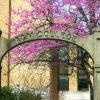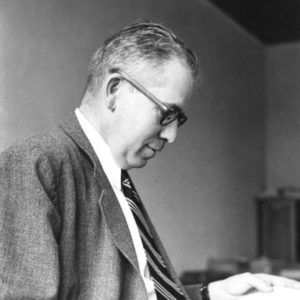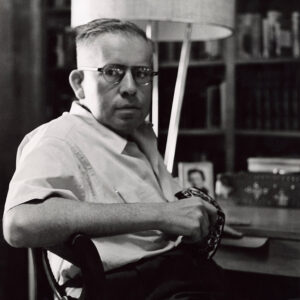calsfoundation@cals.org
Ben Drew Kimpel (1915–1983)
Ben Drew Kimpel, a professor of English at the University of Arkansas (UA) in Fayetteville (Washington County) from 1952 to 1983, was a widely respected scholar and linguist. He wrote the definitive biography of eighteenth-century novelist Samuel Richardson with UA colleague Duncan Eaves; they also published numerous articles on Richardson and the works of twentieth-century poet Ezra Pound and edited a 1971 edition of Richardson’s novel Pamela.
Ben Kimpel was born on November 5, 1915, in Fort Smith (Sebastian County). He was the only son of attorney Ben Drew Kimpel Sr. and Gladys Kimpel.
Kimpel attended the public schools (with a private tutor in French) and graduated from Fort Smith High School at age fourteen. He attended Phillips Exeter Academy in New Hampshire for two years before enrolling at Harvard University in 1931. He graduated with a bachelor’s degree in English in 1936. To satisfy his mother, he attended Harvard Law School for one semester but then transferred to the Harvard Graduate School of Arts and Sciences, where he received his MA in English in 1939.
Desiring a change in institution, geography, and climate, he went from Harvard to the University of North Carolina at Chapel Hill, where he specialized in American literature and wrote his dissertation on Herman Melville. Immediately after receiving his PhD in 1942, he enlisted as a private in the U.S. Army, although he could have tried for a commission. He was sent to intensive language school and served with a civil affairs unit in France during World War II. He was commissioned a second lieutenant before being discharged in 1946.
Upon joining the State Department soon after, Kimpel served as first secretary and public affairs officer in Vienna from 1946 to 1950. He was immersed in studying Russian language and literature. Not finding bureaucracy to his liking following a transfer to Washington DC, he left the department and did postdoctoral work in medieval literature at Harvard until 1952.
Visiting his mother in Fort Smith, he passed through Fayetteville to visit friends. They convinced him to join the UA English department faculty, where he remained for more than thirty years. He taught a wide variety of courses, from Anglo-Saxon and Beowulf to contemporary novel. He told his teaching assistants that a lecturer’s knowledge of the course material should be like an iceberg, with only one-eighth showing above the surface, and also insisted there was no excuse for not correcting and returning every exam and paper by the next class period.
For three semesters, he co-taught a course in twentieth-century thought with Dr. Lothar Schafer of the chemistry department, treating parallel developments in modern science and literature. In 1961, he was the first recipient of UA’s Alumni Association Faculty Distinguished Achievement Award.
Although many students at first found his vast knowledge intimidating, many came to regard him as a wise and sympathetic counselor who would help with an array of problems, not all academic. He enjoyed and often hosted graduate student parties and always loved dancing (he was well known for the Charleston and jitterbug) in spite of his great weight, which at times approached 300 pounds.
He had a lifelong passion for travel. When he was eleven, his mother dispatched him to Europe with an uncle while she stayed at home. He later visited every continent, including Antarctica. One of his favorite trips was a sailing voyage as a passenger/crew member, appropriately serving as a cook. He was an energetic traveler, doing extensive library and museum work, sometimes seeing three plays in a day in London and catching up on scientific reading in transit.
He spoke French, Russian, Italian, German, Greek, and Chinese fluently and had a reading and writing knowledge of several other ancient and esoteric languages, having taught himself or studied with tutors. It was his habit at one time to read 100 lines of ancient Greek before breakfast each morning.
He is best known for coauthorship of Samuel Richardson, a Biography, written with Eaves and published in 1971. They had researched a wealth of new material on the eighteenth-century novelist’s life and included comments on his personality and opinions and a list of his numerous correspondents. The book was immediately accepted by scholars as the definitive biography. Critics praised their close and exact readings of the various texts of Richardson’s novels: Pamela, Clarissa, and Sir Charles Grandison. Between them, Kimpel and Eaves wrote more than thirty-six short published articles that they were then able to cite in the bibliography in order not to overwhelm the reader with insignificant but useful scholarly details.
Their next major project was a line-by-line explication of Ezra Pound’s The Cantos (a principal reason for Kimpel’s study of Chinese). He and Eaves worked almost daily on this task from 1973 to 1983. Although they did not complete the project, they published twenty-three articles in such journals as Paiduema, American Literature, and Philological Quarterly.
Kimpel died on April 21, 1983, at his home in Fayetteville. He was sitting in his favorite armchair, preparing for his usual evening conference with Eaves, a volume of Pound’s Cantos in his lap, a Chinese dictionary on the table beside him, and an unlit cigarette and a pack of matches in his hand. He is buried in Fort Smith. The UA Communications Building was renamed Kimpel Hall in his honor.
The Porter Fund, established in 1984, was founded in honor of Kimpel. It supports the written arts in the state of Arkansas, specifically by awarding an annual prize, which has been designated the Porter Prize, to an Arkansas writer. At Kimpel’s request, the prize was named in memory of his mother, Gladys Crane Kimpel Porter.
For additional information:
Rudolph, Leighton. “Ben Drew Kimpel.” In Some Illustrious Educators of Old Main, edited by Thomas Kennedy. Fayetteville: University of Arkansas Alumni Association, 1991.
Williams, Paul H. “In Memorius: Ben Kimpel.” Arkansas Times, July 1983, p. 12.
Wink, Susan Wade. Ben Kimpel. N.p.: 2021.
Cathy Boyd
Fayetteville, Arkansas
This entry, originally published in Arkansas Biography: A Collection of Notable Lives, appears in the CALS Encyclopedia of Arkansas in an altered form. Arkansas Biography is available from the University of Arkansas Press.
 Education, Higher
Education, Higher Literature and Authors
Literature and Authors World War II through the Faubus Era, 1941 through 1967
World War II through the Faubus Era, 1941 through 1967 Ben Kimpel
Ben Kimpel  Ben Kimpel
Ben Kimpel 




I was a graduate student in comparative literature from 1960 to 1963 in Fayetteville and had the great fortune to take two of Dr. Kimpel’s classes. His knowledge and mastery of the subject matter were phenomenal. His class in Oriental Literature in Translation literally changed my view of the world. He was a unique teacher with his own take on how things were done. For example, in his class in Eastern European Literature in Translation, he often read to us rather than “lecture.” I can still hear him in my head reading from The Brothers Karamazov, which he said could be argued to be the greatest novel ever written. He was a gracious host and guest. He came to my home a couple of times after the closing of the bars. I recall a night when my young wife cooked him a giant plate of scrambled eggs, which he devoured with gusto and appreciation. He was a big man with a big appetite. We graduate students at the time politely called him “God.”